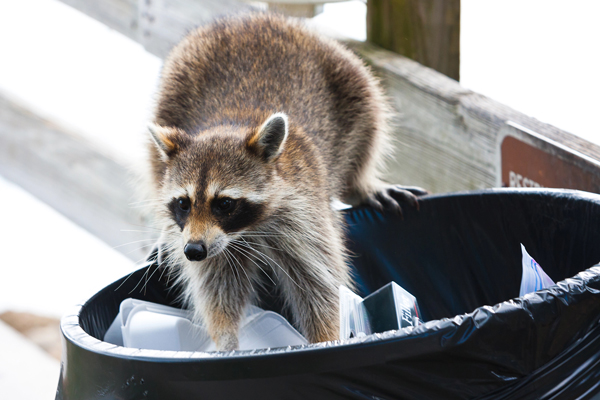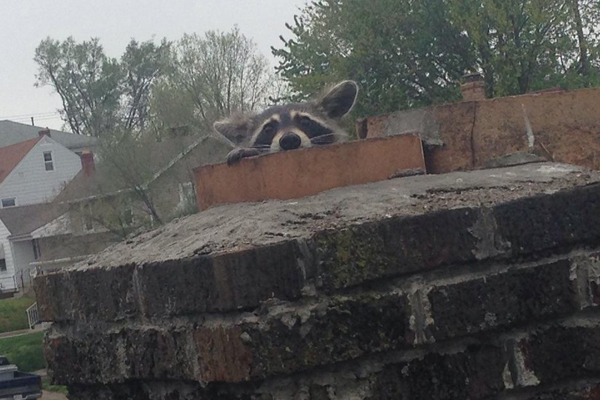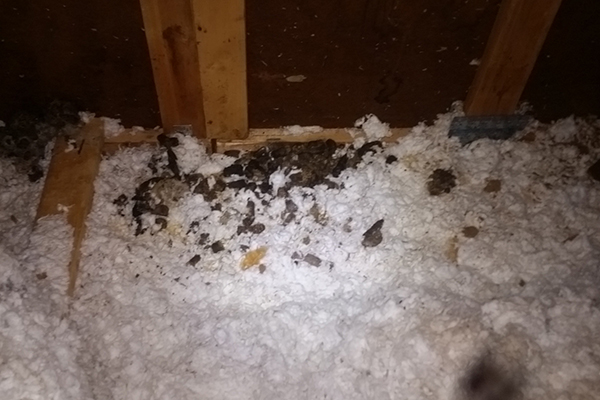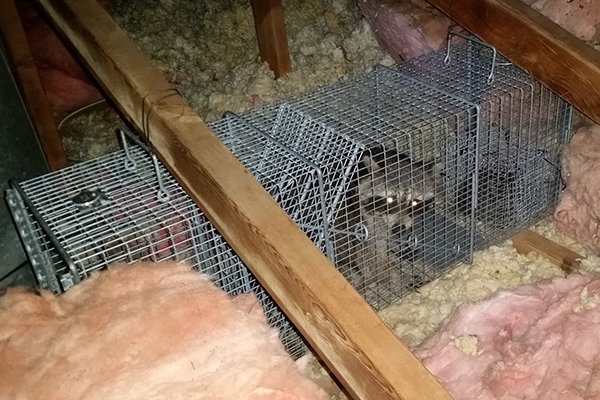Our topic, “Why raccoons get into trash Dayton Ohio,” is a popular question we get from our daily calls. Residents of Dayton, Ohio, and the Miami Valley Region are no strangers to raccoons. These masked bandits are clever, persistent, and opportunistic, which makes them one of the most common nuisance animals in the Miami Valley region. One of the primary reasons homeowners call Barnes Wildlife Control is because raccoons have been tearing into trash cans, scattering garbage across yards, and leaving behind a huge mess. Understanding why raccoons get into trash and what you can do to prevent it is the first step toward protecting your property, keeping your neighborhood clean, and avoiding potential health hazards.
This raccoon found safety and an open food source at this home.
Why Raccoons Target Trash Cans
Raccoons are omnivores with an excellent sense of smell, which means they eat everything from fruits and vegetables to meat scraps and pet food. For them, trash cans are essentially an all-you-can-eat buffet filled with calorie-rich meals that are easy to access if containers aren’t secured. In suburban areas like Dayton, OH, raccoons have learned to rely on residential garbage as a consistent food source, especially when natural supplies such as berries or insects are scarce.
Another reason raccoons target trash is their intelligence. Studies have shown that raccoons are problem-solvers, capable of figuring out how to open latches, flip lids, and even knock over large containers. Unlike other wildlife, raccoons don’t give up easily. Once they find food in your trash, they will return night after night, teaching their young that your property is a reliable feeding ground.
Problems Caused by Raccoons in Trash
Raccoons digging through garbage may seem like just a nuisance, but the consequences go far beyond a messy lawn. Trash raids can spread diseases such as leptospirosis, salmonella, or raccoon roundworm, all of which pose risks to humans and pets. When garbage is scattered across a yard, it attracts other pests like rodents, stray cats, and insects, which compounds the problem.
In Dayton’s residential neighborhoods, this can also create tension between homeowners, as one household’s unsecured trash cans can attract raccoons for the entire block. Businesses such as restaurants and apartment complexes face even greater issues since large dumpsters provide even more incentive for raccoons to gather in numbers. A single family of raccoons can quickly turn a property into a nightly feeding ground if action isn’t taken.
Why Raccoons Get Into Trash Dayton Ohio? Raccoon Problems? Don’t Fret! Call Barnes Wildlife Control’s Raccoon Trapping Team At (937) 340-1867.
Signs Raccoons Are Raiding Your Trash
It’s usually obvious when raccoons have been at work. Homeowners in Dayton often wake up to tipped-over cans, shredded garbage bags, and trails of food scraps across driveways or yards. Unlike dogs or cats, raccoons tend to tear through bags with sharp claws, leaving distinct puncture marks. You may also notice muddy paw prints, overturned lids, or foul odors from decomposing waste that has been exposed overnight. In some cases, residents even spot raccoons rummaging in trash late at night or hear the noise of cans being knocked over.
How to Prevent Raccoons From Getting Into Trash
Preventing raccoon activity starts with eliminating the attraction. The first and most effective step is to secure garbage cans. Heavy-duty trash bins with locking lids are much harder for raccoons to open. If your cans don’t have locks, adding bungee cords or specialized wildlife-resistant straps can make a huge difference.
Placement also matters. Leaving trash cans at the curb overnight invites raccoons to feast, especially since they are most active after dark. In Dayton, it’s wise to put trash out early in the morning on collection day rather than the night before. If possible, keep cans inside a garage or shed until pickup.
Another strategy is to reduce odors. Double-bagging food scraps, rinsing containers before tossing them, and keeping lids tightly sealed all help minimize smells that draw raccoons from blocks away. For added protection, homeowners can sprinkle ammonia or vinegar around trash areas, as the strong scent tends to repel raccoons.
Additional Steps for Businesses in Dayton, OH, and Beyond
Commercial properties such as restaurants and apartment complexes in the Miami Valley area of Ohio face even greater raccoon challenges. Large dumpsters provide a consistent food source, and once raccoons associate a business with food, they’re difficult to deter. To prevent dumpster raids, it’s crucial to use tight-fitting lids and lock them after hours. Regular cleaning of the area is also important since spilled grease, crumbs, or leftovers around dumpsters will continue to attract wildlife.
For businesses, securing trash isn’t just about preventing messes – it’s also about maintaining health code compliance. Raccoon activity can lead to contamination, customer complaints, and potential fines if not addressed quickly. Barnes Wildlife Control provides wildlife prevention services tailored for both residential and commercial properties.
Why DIY Prevention May Not Be Enough
While homeowners can take preventive measures, raccoons are incredibly persistent. Once they learn your trash is a reliable food source, they may ignore deterrents and continue returning. Some residents attempt to trap raccoons on their own, but in Ohio, nuisance wildlife trapping is regulated by law. Traps must be checked daily, and captured raccoons cannot simply be relocated to another property or public land. Improper handling could lead to fines or animal welfare violations.
That’s why working with professionals like Barnes Wildlife Control is essential. Our licensed experts understand Ohio’s wildlife laws, use safe and humane trapping methods, and provide long-term solutions that address the root of the problem rather than offering short-term fixes.
A raccoon found refuge in this attic and left a mess.
A successful live raccoon trapping of this unwelcome attic resident.
Want To Email Us? No Problem! Go To Barnes Wildlife Control’s Contact Form.
Long-Term Solutions With Barnes Wildlife Control
At Barnes Wildlife Control, we go beyond just keeping raccoons out of trash cans. Our team provides thorough inspections to identify what’s attracting raccoons to your property, whether it’s unsecured garbage, pet food left outdoors, or easy entry points into your attic or crawl space. By combining secure trash management with exclusion techniques, we make your property far less appealing to nuisance wildlife.
For many homeowners in the Dayton, OH, region, preventing raccoons from accessing trash is the first step, but exclusion and ongoing monitoring are just as important. Once raccoons lose access to easy food, they move on, but if other attractants remain, they may return. Our goal is to create a long-term plan that ensures your property remains raccoon-free.
Call Barnes Wildlife Control Today
If raccoons are raiding your trash in Dayton, Ohio, don’t wait until the problem escalates. What starts as a few tipped-over garbage cans can quickly become a serious health and sanitation issue. Barnes Wildlife Control specializes in raccoon removal and prevention in Dayton, OH, and beyond, with proven strategies to secure your property and restore peace of mind.
Call us today at Phone: (937) 340-1867 to schedule an inspection and learn how our team can help you prevent raccoons from targeting your trash, or we can trap and remove an intruder. With our expertise, your garbage cans stay secure, your property stays clean, and your family stays protected from the dangers of wildlife intrusion.




